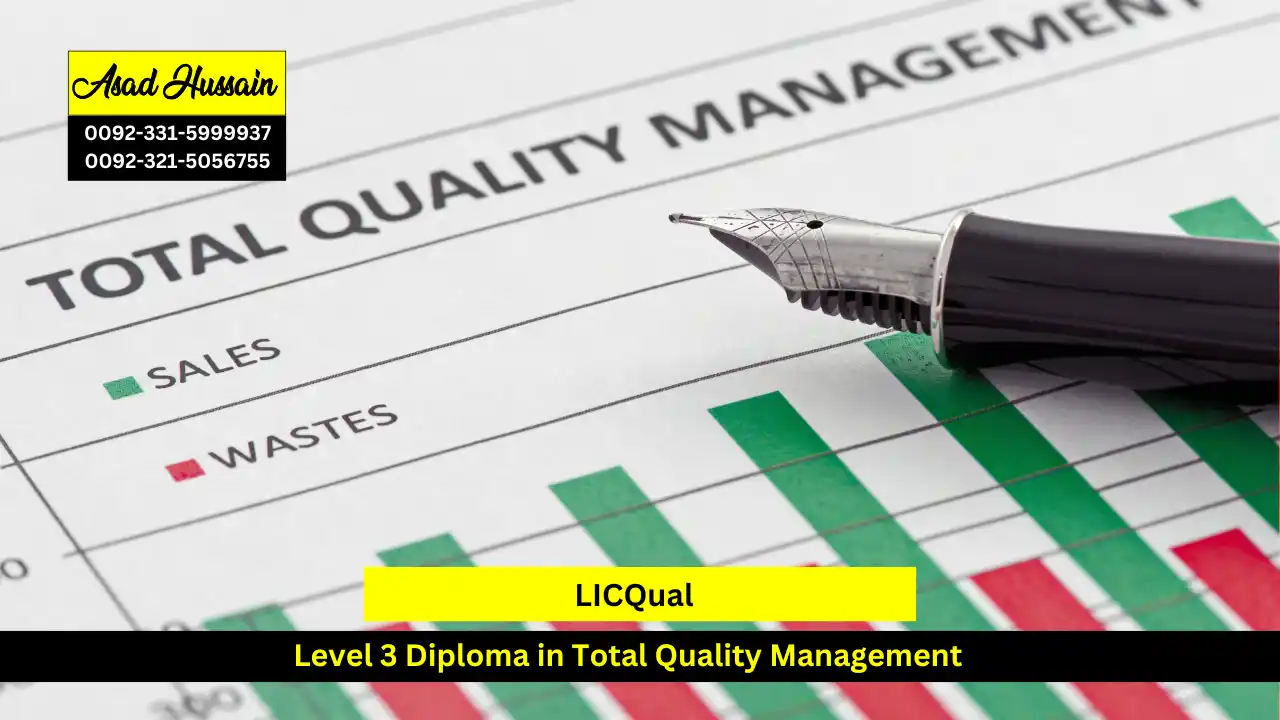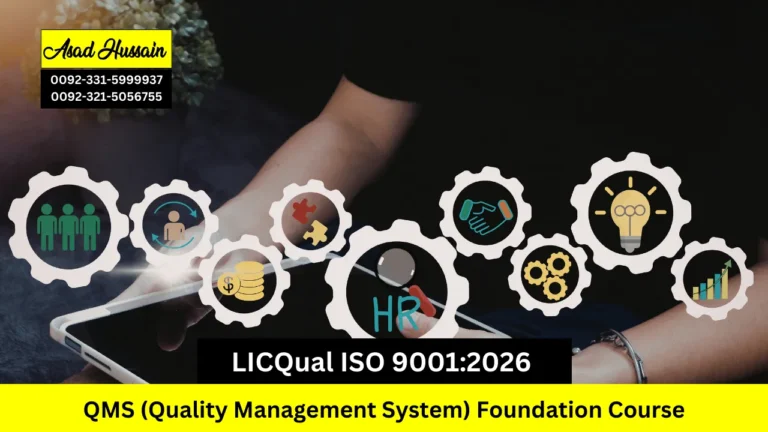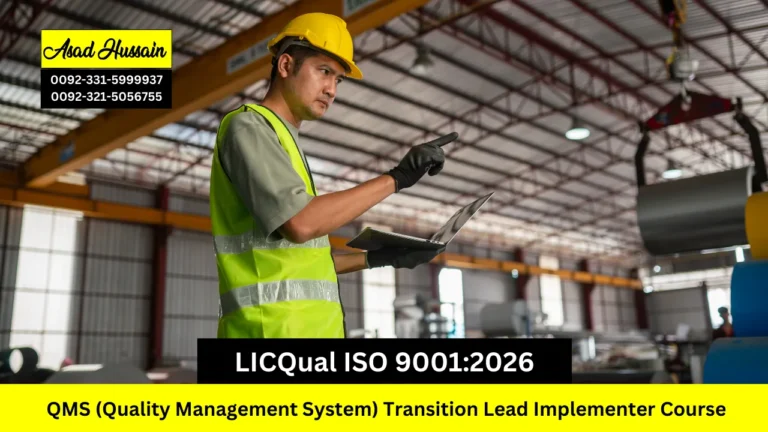In today’s competitive business landscape, quality isn’t just a goal—it’s a necessity. Organizations across industries strive to maintain high standards, ensuring their products and services not only meet but exceed customer expectations. This drive for excellence is where Total Quality Management (TQM) comes into play. If you’re looking to enhance your skills and play a pivotal role in promoting quality within your organization, the Level 3 Diploma in Total Quality Management could be your gateway to success.
Total Quality Management is a comprehensive approach focused on improving the quality of an organization’s products, services, and processes. TQM integrates all organizational functions (marketing, finance, design, engineering, production, customer service, etc.) to focus on meeting customer needs and organizational objectives. This holistic approach involves every employee in the continuous improvement process, aiming for long-term success through customer satisfaction.
The Level 3 Diploma in Total Quality Management is an invaluable qualification for anyone looking to advance their career in quality management. It not only provides you with the technical knowledge and skills needed to excel in this field but also empowers you to drive significant improvements within your organization. By mastering TQM principles and practices, you can help your organization achieve excellence, enhance customer satisfaction, and maintain a competitive edge in the market.
Program Highlights
Mandatory Units
- Introduction to Total Quality Management
- Quality Planning and Control
- Quality Assurance and Auditing
- Continuous Improvement Techniques
- Quality Management Tools and Techniques
- Managing Quality Across Functions
- Quality Management Systems Implementation
Educational Background
- Minimum Qualification: Typically, candidates should have at least a Level 2 qualification or equivalent, such as GCSEs in English and Mathematics. Some programs may also accept relevant work experience in place of formal qualifications.
- Relevant Experience: Although not always mandatory, having some background or experience in quality management or a related field can be beneficial. This could include roles in quality assurance, quality control, or process improvement.
Professional Experience
- Work Experience: Practical experience in a business environment, particularly in roles related to quality management, is often recommended. This experience helps candidates relate course concepts to real-world applications.
- Industry Exposure: Experience or exposure to industries where quality management is critical, such as manufacturing, healthcare, or service sectors, can be advantageous.
Basic Skills
- Numeracy and Literacy: Competence in basic numeracy and literacy is required. The course involves statistical analysis and written assignments, so a good grasp of these skills is essential.
- Computer Skills: Familiarity with basic computer applications, such as word processing and spreadsheets, is necessary for completing assignments and projects.
Language Proficiency
- English Language Skills: For non-native English speakers, proficiency in English is required. This is typically demonstrated through standardized tests such as IELTS, TOEFL, or equivalent qualifications. Some institutions may offer an internal assessment to determine language proficiency.
Motivation and Commitment
- Commitment to Learning: A genuine interest in quality management and a commitment to learning are crucial. The course requires active participation, dedication to coursework, and engagement in practical assignments.
- Career Goals: A clear understanding of how the diploma aligns with your career goals and aspirations in quality management can enhance your motivation and focus throughout the program.
Application Process
- Application Form: Candidates need to complete an application form, which may include providing details about educational background, work experience, and career objectives.
- Supporting Documents: Submission of supporting documents such as academic transcripts, CVs, and a personal statement may be required.
- Interview: Some institutions may conduct an interview or assessment to gauge the candidate’s suitability for the course.
Introduction to Total Quality Management
- Understand the Fundamentals: Define Total Quality Management (TQM) and explain its core principles, including customer focus, continuous improvement, and employee involvement.
- Historical Context: Describe the evolution of TQM and its significance in modern business practices.
- TQM Frameworks: Identify and explain various TQM models and frameworks, such as the Deming Cycle and the Baldrige Criteria for Performance Excellence.
- Implementation Challenges: Discuss common challenges and barriers to implementing TQM and strategies to overcome them.
Quality Planning and Control
- Develop Quality Plans: Create and document effective quality plans aligned with organizational goals and customer requirements.
- Control Techniques: Apply various quality control techniques, including Statistical Process Control (SPC) and control charts, to monitor and control processes.
- Setting Quality Standards: Define and establish quality standards and benchmarks for products and services.
- Quality Metrics: Identify and use key quality metrics and performance indicators to measure and improve process performance.
Quality Assurance and Auditing
- Quality Assurance Concepts: Explain the principles of quality assurance and its role in ensuring that products and services meet specified requirements.
- Audit Processes: Conduct internal and external quality audits to assess compliance with quality standards and regulations.
- Audit Reporting: Develop and present audit reports, including findings, recommendations, and action plans for improvement.
- Corrective Actions: Identify and implement corrective and preventive actions based on audit results to enhance quality management practices.
Continuous Improvement Techniques
- Identify Improvement Opportunities: Use tools such as Root Cause Analysis (RCA) and Failure Mode and Effects Analysis (FMEA) to identify areas for improvement.
- Implement Improvement Strategies: Apply continuous improvement methodologies, including Lean, Six Sigma, and Kaizen, to optimize processes and enhance quality.
- Monitor Improvement Initiatives: Track and measure the effectiveness of improvement initiatives using performance metrics and feedback.
- Foster a Culture of Improvement: Promote a culture of continuous improvement within the organization through training, communication, and leadership.
Quality Management Tools and Techniques
- Utilize Quality Tools: Apply quality management tools such as Pareto Analysis, Fishbone Diagrams (Ishikawa), and Failure Mode Effects Analysis (FMEA) to analyze and solve quality issues.
- Data Analysis: Use statistical methods and software to analyze data and support decision-making in quality management.
- Process Mapping: Develop process maps and flowcharts to visualize and improve process flows.
- Benchmarking: Conduct benchmarking studies to compare performance with industry standards and best practices.
Managing Quality Across Functions
- Cross-Functional Collaboration: Understand the role of different functions (e.g., production, marketing, customer service) in maintaining and improving quality.
- Integrate Quality Management: Implement strategies to integrate quality management practices across various departments and functions.
- Cross-Functional Teams: Facilitate and lead cross-functional teams to address quality issues and drive improvement initiatives.
- Communication: Develop effective communication strategies to ensure alignment and cooperation among departments in achieving quality goals.
Quality Management Systems Implementation
- System Design: Design and implement a Quality Management System (QMS) that meets organizational needs and regulatory requirements.
- QMS Standards: Understand and apply international standards for quality management systems, such as ISO 9001.
- System Documentation: Develop and maintain documentation required for a QMS, including policies, procedures, and records.
- System Evaluation: Evaluate the effectiveness of the QMS through audits, performance reviews, and feedback mechanisms, and make necessary adjustments for continuous improvement.
The Level 3 Diploma in Total Quality Management is designed for professionals and individuals who are keen to advance their expertise in quality management and drive continuous improvement within their organizations. This course is ideal for those currently working in quality assurance, quality control, or related roles, as well as those aspiring to transition into these fields. It is particularly beneficial for managers, supervisors, and team leaders who need to implement and oversee quality initiatives across various functions. Additionally, the course is suited for individuals seeking to enhance their understanding of TQM principles and tools, aiming to contribute to organizational success through effective quality management practices. Whether you’re looking to refine your skills, gain a formal qualification, or take on new responsibilities, this diploma provides the knowledge and practical insights needed to excel in the dynamic field of quality management.







